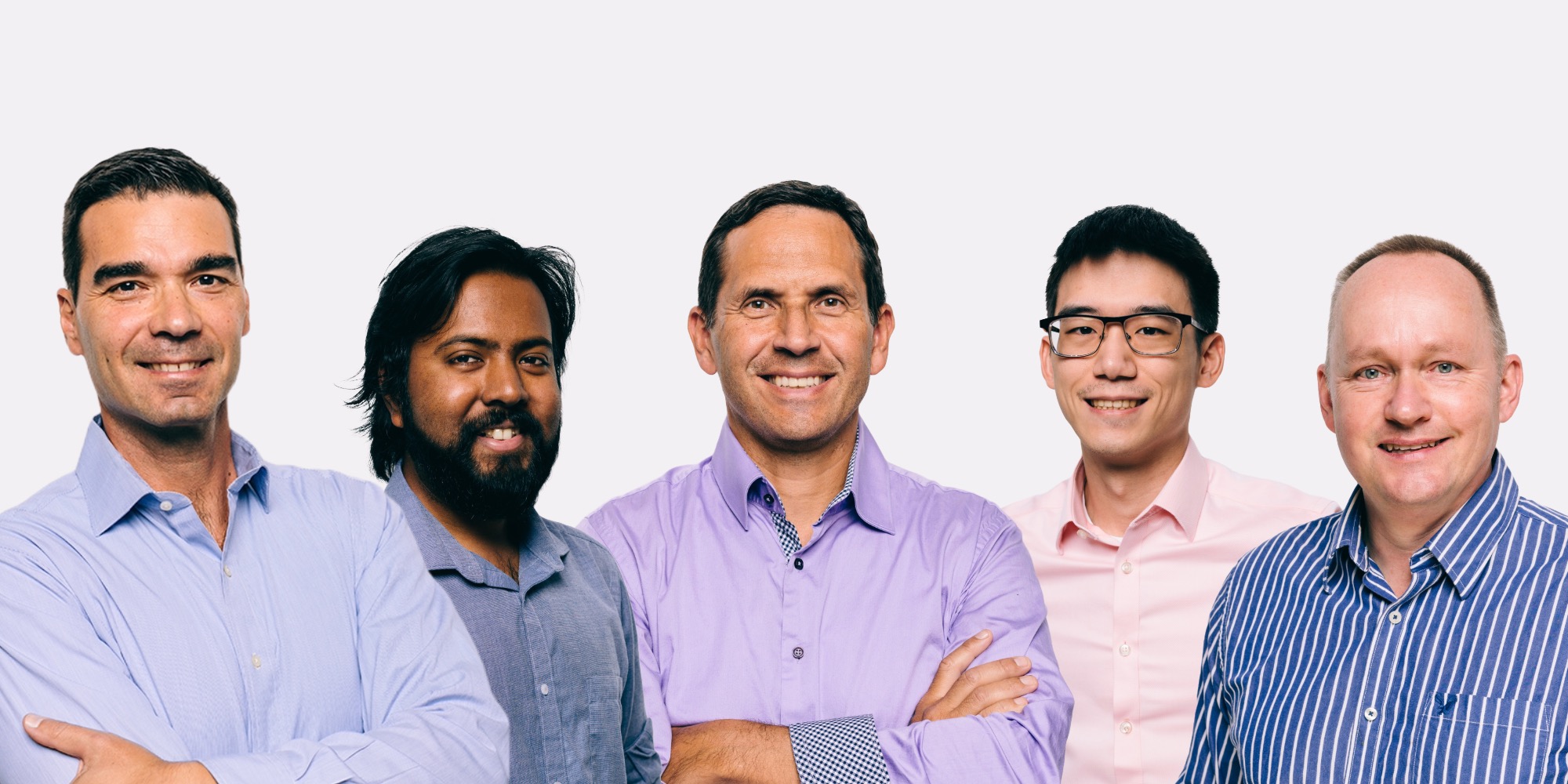Purdue CS graphics and vision faculty presented 14 papers at CVPR 2024
06-25-2024

Purdue CS professors Petros Drineas, Aniket Bera, Daniel Aliaga, Raymond Yeh, and Bedrich Benes presented 13 papers at the 2024 IEEE Conference on Computer Vision and Pattern Recognition (CVPR)
This year, Purdue CS computer graphics and computer vision faculty presented 14 papers at the 2024 IEEE Conference on Computer Vision and Pattern Recognition (CVPR) is the No. 1 conference in Engineering & Computer Science and the No. 2 ranked venue for publication across all disciplines per Google Scholar.
The conference was held in Seattle from June 17-21. CVPR is the premier annual computer vision event, comprising the main conference and several co-located workshops and short courses. Purdue CS faculty presented 11 papers at the main conference and three at associate workshops: Aliaga (1), Benes (4 main + 1 WS), Bera (4 main + 1 WS), Drineas (1 main) and Yeh (2 main + 2 WS). One paper was co authored by Bera and Benes.
Daniel Aliaga:
Yizhi Song, Zhifei Zhang, Zhe Lin, Scott Cohen, Brian Price, Jianming Zhang, Soo Ye Kim, He Zhang, Wei Xiong, Daniel Aliaga; Imprint: Generative object compositing by learning identity-preserving representation, Proceedings of the IEEE/CVF Conference on Computer Vision and Pattern Recognition (CVPR), 2024, pp. 8048-8058
Bedrich Benes:
Yuan Li, Zhihao Liu, Bedrich Benes, Xiaopeng Zhang, Jianwei Guo; SVDTree: Semantic Voxel Diffusion for Single Image Tree Reconstruction, Proceedings of the IEEE/CVF Conference on Computer Vision and Pattern Recognition (CVPR), 2024, pp. 4692-4702
Pu Li, Jianwei Guo, Huibin Li, Bedrich Benes, Dong-Ming Yan; SfmCAD: Unsupervised CAD Reconstruction by Learning Sketch-based Feature Modeling Operations, Proceedings of the IEEE/CVF Conference on Computer Vision and Pattern Recognition (CVPR), 2024, pp. 4671-4680
Yichen Sheng, Zixun Yu, Lu Ling, Zhiwen Cao, Xuaner Zhang, Xin Lu, Ke Xian, Haiting Lin, Bedrich Benes; Dr. Bokeh: DiffeRentiable Occlusion-aware Bokeh Rendering, Proceedings of the IEEE/CVF Conference on Computer Vision and Pattern Recognition (CVPR), 2024, pp. 4515-4525
Jacek Kałużny, Yannik Schreckenberg, Karol Cyganik, Peter Annighöfer, Soren Pirk, Dominik Michels, Mikolaj Cieslak, Farhah Assaad, Bedrich Benes, Wojtek Palubicki; LAESI: Leaf Area Estimation with Synthetic Imagery, Synthetic Data for Computer Vision Workshop @ CVPR 2024
Aniket Bera:
Juanwu Lu, Can Cui, Yunsheng Ma, Aniket Bera, Ziran Wang; Quantifying Uncertainty in Motion Prediction with Variational Bayesian Mixture, Proceedings of the IEEE/CVF Conference on Computer Vision and Pattern Recognition (CVPR), 2024, pp. 15428-15437
Yunsheng Ma, Can Cui, Xu Cao, Wenqian Ye, Peiran Liu, Juanwu Lu, Amr Abdelraouf, Rohit Gupta, Kyungtae Han, Aniket Bera, James M. Rehg, Ziran Wang; Lampilot: An open benchmark dataset for autonomous driving with language model programs, Proceedings of the IEEE/CVF Conference on Computer Vision and Pattern Recognition (CVPR), 2024, pp. 15141-15151
Uttaran Bhattacharya, Aniket Bera, Dinesh Manocha; Speech2UnifiedExpressions: Synchronous Synthesis of Co-Speech Affective Face and Body Expressions from Affordable Inputs Proceedings of the IEEE/CVF Conference on Computer Vision and Pattern Recognition (CVPR) Workshops, 2024, pp. 1877-1887 (In collaboration with Adobe Research)
Petros Drineas:
Shreyas Fadnavis, Agniva Chowdhury, Joshua Batson, Petros Drineas, and Eeleftherios Garyfallidis; Patch2Self2: Self-supervised Denoising on Coresets via Matrix Sketching,Proceedings of the IEEE/CVF Conference on Computer Vision and Pattern Recognition (CVPR), 2024, pp. 22160-2216
Raymond Yeh:
Renan A. Rojas-Gomez, Teck-Yian Lim, Minh N. Do, Raymond A. Yeh; Making Vision Transformers Truly Shift-Equivariant, Proceedings of the IEEE/CVF Conference on Computer Vision and Pattern Recognition (CVPR), 2024, pp. 5568-5577
Joshua Ahn, Haochen Wang, Raymond A. Yeh, Greg Shakhnarovich, Alpha Invariance: On Inverse Scaling Between Distance and Volume Density in a Neural Radiance Field, Proceedings of the IEEE/CVF Conference on Computer Vision and Pattern Recognition (CVPR), 2024, pp 20396-20405
Amber Yijia Zheng, Raymond A. Yeh, Towards Safer AI Content Creation by Immunizing Text-to-image Models, AI for Content Creation Workshop @ CVPR 2024 (best paper runner-up)
Boheng Zhao, Rana Hanocka, Raymond A. Yeh, AmbiGen: Generating Ambigrams from Pre-trained Diffusion Model, Workshop on Graphic Design Understanding and Generation@ CVPR
Bedrich Benes and Aniket Bera:
Lu Ling, Yichen Sheng, Zhi Tu, Wentian Zhao, Cheng Xin, Kun Wan, Lantao Yu, Qianyu Guo, Zixun Yu, Yawen Lu, Xuanmao Li, Xingpeng Sun, Rohan Ashok, Aniruddha Mukherjee, Hao Kang, Xiangrui Kong, Gang Hua, Tianyi Zhang, Bedrich Benes, Aniket Bera; DL3DV-10K: A Large-Scale Scene Dataset for Deep Learning-Based 3D Vision. Proceedings of the IEEE/CVF Conference on Computer Vision and Pattern Recognition (CVPR), 2024, pp. 22160-2216 (in Collaboration with Google Research and Adobe Research)
About the Department of Computer Science at Purdue University
Founded in 1962, the Department of Computer Science was created to be an innovative base of knowledge in the emerging field of computing as the first degree-awarding program in the United States. The department continues to advance the computer science industry through research. US News & Reports ranks Purdue CS #19 and #18 overall in graduate and undergraduate programs respectively, 6th in cybersecurity, 8th in software engineering, 15th in programming languages and systems, 13th in systems, and 18th in theory. Graduates of the program are able to solve complex and challenging problems in many fields. Our consistent success in an ever-changing landscape is reflected in the record undergraduate enrollment, increased faculty hiring, innovative research projects, and the creation of new academic programs. The increasing centrality of computer science in academic disciplines and society, and new research activities—centered around foundations and applications of artificial intelligence and machine learning, such as natural language processing, human computer interaction, vision, and robotics, as well as systems and security—are the future focus of the department. cs.purdue.edu